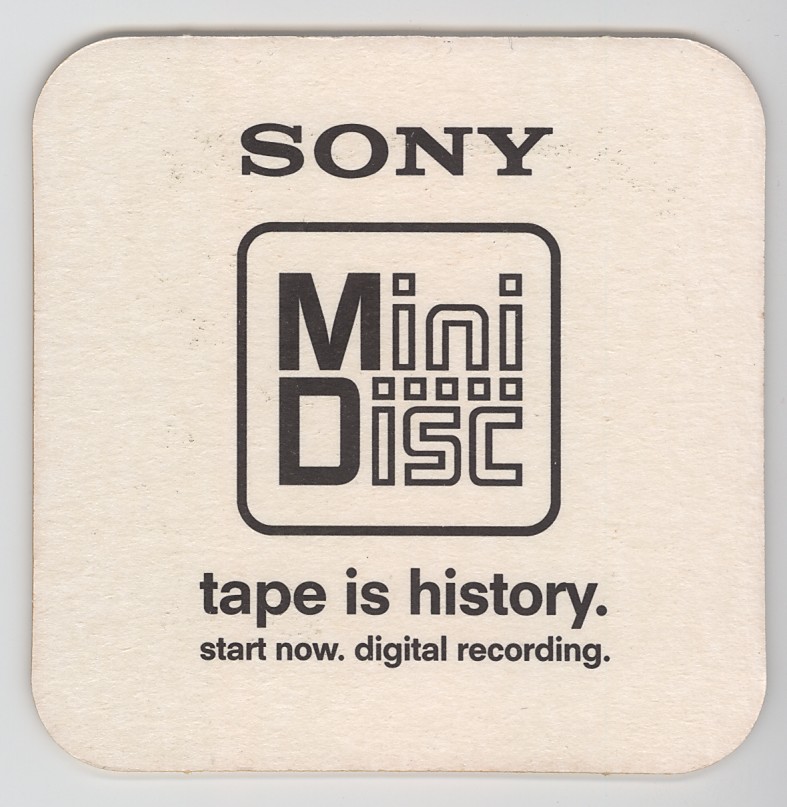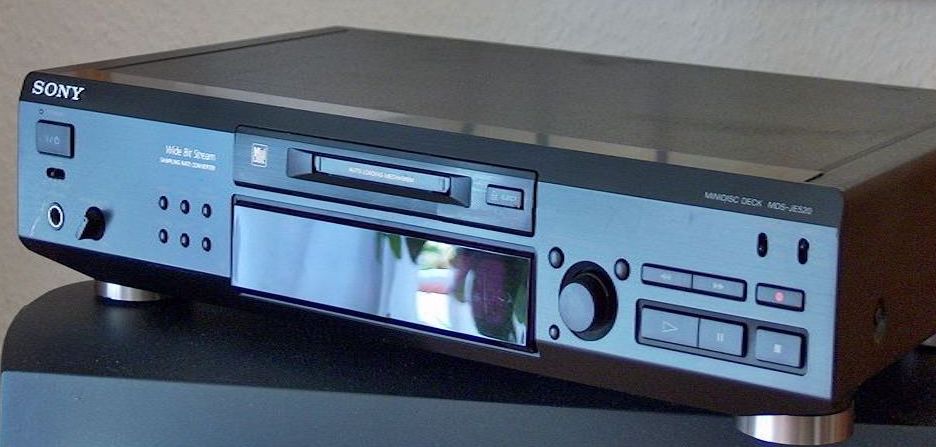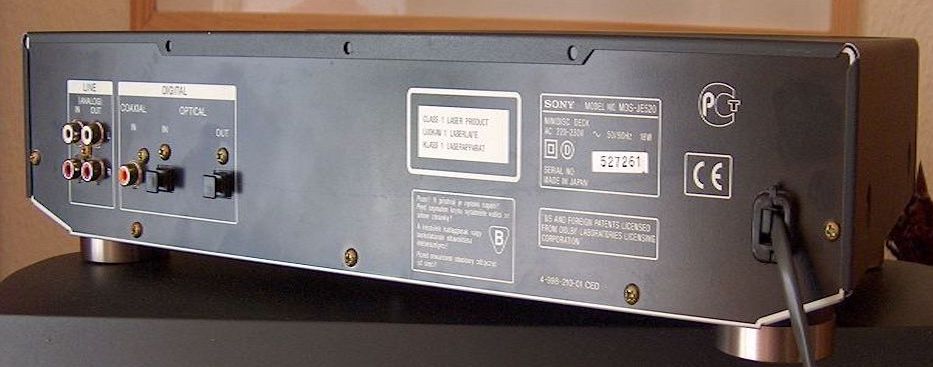Difference between revisions of "Sony MDS-JE 520"
m |
|||
| (One intermediate revision by one other user not shown) | |||
| Line 1: | Line 1: | ||
| − | [[ | + | [[File:MD-instead-tape Sony 1390890329.jpg|mini|von Niels Heidenreich aus Hannover, Germany; Lizenz [https://creativecommons.org/licenses/by/2.0/deed.de CC-BY-2.0]] |
__NOTOC__ | __NOTOC__ | ||
| − | == | + | == Dates == |
| − | {{ | + | {{navigation}} |
| − | ''' | + | '''General''' |
| − | * | + | * Manufacturer: Sony |
| − | * | + | * Model: MDS-JE 520 |
| − | * | + | * Type: MiniDisk-Player |
| − | * | + | * Years of manufacture: 1998-1999 |
| − | * | + | * Made in: Japan |
| − | * | + | * Color: Black, Silver |
| − | * | + | * Remote control: yes, Sony RM-D15M |
| − | * | + | * Power consumption: 18 watts |
| − | + | * Dimensions: 430 x 95 x 280 mm (WxHxD) | |
| + | * Weight: 3,4kg | ||
| + | * Original price approx.: DM 600,00 | ||
| − | ''' | + | '''Connections''' |
| − | * | + | * Number of inputs: 3 |
| − | + | Line In analog (Cinch): 47 kΩ (input imp.) / 500 mV rms (nominal) / 125 mV rms (min.) | |
| − | ** Digital In | + | ** Digital In optical (Toslink): 660 nm (wavelength) |
| − | + | Digital In (Coaxial): 75 Ω (Input Imp.) / 0.5 Vpp ±20% (Nominal) | |
| − | * | + | * Number of outputs: 3 |
| − | ** Line Out (Cinch): 2 V | + | ** Line Out (Cinch): 2 V rms (at 50 kΩ) (nominal) / over 10 kΩ (load imp.) |
| − | ** Digital Out | + | ** Digital Out optical (Toslink): -18 dBm / 660 nm (wavelength). |
| − | ** | + | ** Headphone output (6.3mm, adjustable): 28 mW / 32 Ω |
| − | ''' | + | '''Technical Data''' |
| − | * | + | * Converter: D/A- converter and A/D converter. |
| − | * | + | * Laser: semiconductor (λ = 780 nm) continuous emission duration. |
| − | * | + | * laser output power: ≤ 44.6 µW |
| − | * | + | * Laser diode: GaAIAs laser |
| − | * | + | * Speed: 400 min-¹ to 900 min-¹. |
| − | * | + | * Error correction: ACIRC (Advanced Cross Interleave Reed Solomon Code). |
| − | * | + | * Sampling frequency: 44.1 kHz |
| − | * Hi-MD | + | * Coding system (compression of data): Sony ATRAC (Adaptive Transform Acoustic Coding) |
| − | * Anti- | + | * Modulation system: EFM (Eight by Fourteen) |
| − | * | + | * Frequency response: 5 - 20,000 Hz ±0.3 dB |
| − | * | + | * Distortion Factor: N/A |
| − | + | * Signal-to-noise ratio: ≥ 96dB (at playback). | |
| − | + | * Dynamic range: n/a. | |
| − | * | + | * Supported formats: MD |
| − | ** | + | * Hi-MD support: no |
| − | * | + | * Anti-shock: no, but Time Machine recording function (6 sec.) |
| − | ** | + | * Playback functions: yes |
| − | + | * Title programming: yes | |
| − | + | Shuffle: yes | |
| − | ** | + | Repeat: yes |
| − | ** | + | * Recording functions: analogue, digital |
| − | * Fading ( | + | ** Recording modes: mono, stereo |
| + | * Editing functions: | ||
| + | ** Title name editable: yes | ||
| + | Delete: yes | ||
| + | Move: yes | ||
| + | ** Share: yes | ||
| + | ** Connect: yes | ||
| + | * Fading (fade in/out during recording and playback) | ||
| − | ''' | + | '''Special Features''' |
| − | * Fading | + | * Fading function |
| − | * | + | * various other editing functions |
| − | * | + | * digital volume control via remote control |
| − | + | timer for recording, playback | |
| − | + | Cancellation of the last edit (UNDO function) | |
| − | + | 6 seconds memory for radio recordings (Time Machine Recording) | |
| − | + | Stereo/ Mono switchable | |
| − | * | + | * Selector switch for the recording type - digital optical/ coaxial/ analogue |
| − | * | + | * Editing functions also possible on the device |
| − | * | + | * Some functions are basically adjustable via a sub-menu (setting menu) |
| − | + | Other Sony MD remote controls can also be used, but only the RM-D15M and older ones can be named. | |
| − | * | + | * The front of the device is made of plastic - in contrast to the next bigger sibling [[Sony MDS-JB 920|MDS-JB 920]] |
| − | == | + | == Comments == |
| − | + | Other models in the same series: | |
| − | * [[Sony MDS-JE 320|MDS-JE 320]] ( | + | * [[Sony MDS-JE 320|MDS-JE 320]] (entry-level unit) |
| − | * [[Sony MDS-JB 920|MDS-JB 920]] (QS | + | * [[Sony MDS-JB 920|MDS-JB 920]] (QS series) |
| − | + | Predecessors: | |
| − | * [[Sony MDS-JE 510|MDS-JE 510]] ( | + | * [[Sony MDS-JE 510|MDS-JE 510]] (similar in design) |
| − | + | Successor: | |
| − | * [[Sony MDS-JE 530|Sony MDS-JE 530]] ( | + | * [[Sony MDS-JE 530|Sony MDS-JE 530]] (similar in construction, same dimensions, different remote control) |
| − | == | + | == Pictures == |
| − | [[ | + | [[Image:SonyMDSJE520a.jpg]] |
| − | [[ | + | [[Image:SonyMDSJE520c.jpg]] |
| − | == | + | == Reports == |
| − | * Audio 1/1999: | + | * Audio 1/1999: Upper cl. 3 ears, sound good,70 p. (analog:70/ digital: 70) - test winner |
| − | * Stiftung Warentest Test 6/1999 | + | * Stiftung Warentest Test 6/1999 and in the yearbook 2000, p.62-63: good 2.3, sound quality and handling +, power consumption O . "An ideal device for the entry into the Minidisc system is Sony MDS-JE520: comfortably equipped, qualitatively appealing and with 530 Mark very inexpensive." (Test Yearbook, p. 62) |
== Links == | == Links == | ||
| − | [[ | + | [[Category:MD Decks]] |
Latest revision as of 11:50, 21 May 2021
Dates
General
- Manufacturer: Sony
- Model: MDS-JE 520
- Type: MiniDisk-Player
- Years of manufacture: 1998-1999
- Made in: Japan
- Color: Black, Silver
- Remote control: yes, Sony RM-D15M
- Power consumption: 18 watts
- Dimensions: 430 x 95 x 280 mm (WxHxD)
- Weight: 3,4kg
- Original price approx.: DM 600,00
Connections
- Number of inputs: 3
Line In analog (Cinch): 47 kΩ (input imp.) / 500 mV rms (nominal) / 125 mV rms (min.)
- Digital In optical (Toslink): 660 nm (wavelength)
Digital In (Coaxial): 75 Ω (Input Imp.) / 0.5 Vpp ±20% (Nominal)
- Number of outputs: 3
- Line Out (Cinch): 2 V rms (at 50 kΩ) (nominal) / over 10 kΩ (load imp.)
- Digital Out optical (Toslink): -18 dBm / 660 nm (wavelength).
- Headphone output (6.3mm, adjustable): 28 mW / 32 Ω
Technical Data
- Converter: D/A- converter and A/D converter.
- Laser: semiconductor (λ = 780 nm) continuous emission duration.
- laser output power: ≤ 44.6 µW
- Laser diode: GaAIAs laser
- Speed: 400 min-¹ to 900 min-¹.
- Error correction: ACIRC (Advanced Cross Interleave Reed Solomon Code).
- Sampling frequency: 44.1 kHz
- Coding system (compression of data): Sony ATRAC (Adaptive Transform Acoustic Coding)
- Modulation system: EFM (Eight by Fourteen)
- Frequency response: 5 - 20,000 Hz ±0.3 dB
- Distortion Factor: N/A
- Signal-to-noise ratio: ≥ 96dB (at playback).
- Dynamic range: n/a.
- Supported formats: MD
- Hi-MD support: no
- Anti-shock: no, but Time Machine recording function (6 sec.)
- Playback functions: yes
- Title programming: yes
Shuffle: yes Repeat: yes
- Recording functions: analogue, digital
- Recording modes: mono, stereo
- Editing functions:
- Title name editable: yes
Delete: yes Move: yes
- Share: yes
- Connect: yes
- Fading (fade in/out during recording and playback)
Special Features
- Fading function
- various other editing functions
- digital volume control via remote control
timer for recording, playback Cancellation of the last edit (UNDO function) 6 seconds memory for radio recordings (Time Machine Recording) Stereo/ Mono switchable
- Selector switch for the recording type - digital optical/ coaxial/ analogue
- Editing functions also possible on the device
- Some functions are basically adjustable via a sub-menu (setting menu)
Other Sony MD remote controls can also be used, but only the RM-D15M and older ones can be named.
- The front of the device is made of plastic - in contrast to the next bigger sibling MDS-JB 920
Comments
Other models in the same series:
- MDS-JE 320 (entry-level unit)
- MDS-JB 920 (QS series)
Predecessors:
- MDS-JE 510 (similar in design)
Successor:
- Sony MDS-JE 530 (similar in construction, same dimensions, different remote control)
Pictures
Reports
- Audio 1/1999: Upper cl. 3 ears, sound good,70 p. (analog:70/ digital: 70) - test winner
- Stiftung Warentest Test 6/1999 and in the yearbook 2000, p.62-63: good 2.3, sound quality and handling +, power consumption O . "An ideal device for the entry into the Minidisc system is Sony MDS-JE520: comfortably equipped, qualitatively appealing and with 530 Mark very inexpensive." (Test Yearbook, p. 62)


